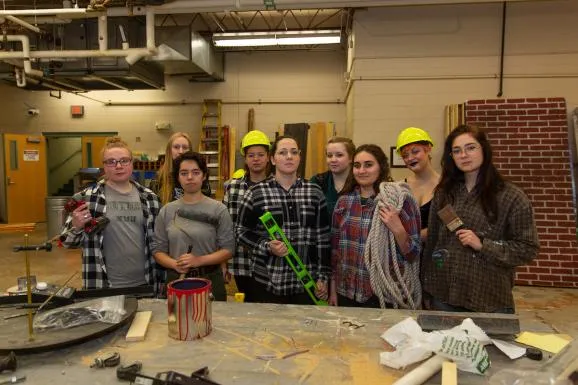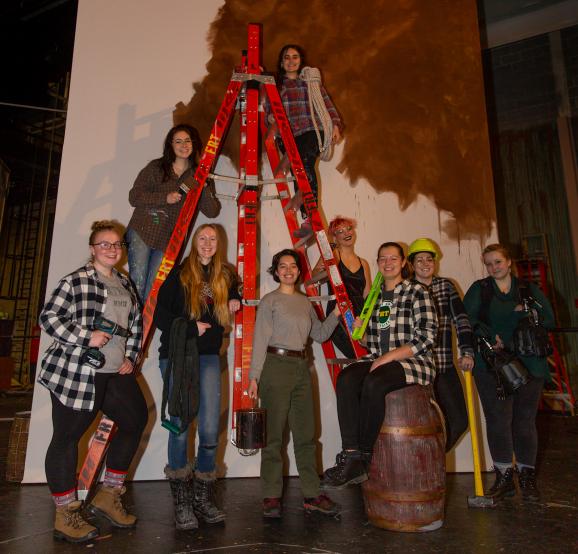Men typically outnumber women in theater technical production jobs, but this underrepresentation is not an issue at Northern Michigan University’s Forest Roberts Theatre (FRT). Ten of the 15 students working at the FRT scene shop on Scrooge! and other productions are women who handle everything from lighting, set and sound design to props and even technical direction.
A study by the League of Professional Theatre Women revealed that in nearly 700 productions from 2010-2017, women were underrepresented in all areas of theater production, except for costuming and stage management. David Pierce, FRT’s Technical Director and Production Manager, said the disparity in technical jobs is due to perpetuated assumptions that women can’t handle the physical demands of working with the equipment. Also, the white male-dominated industry is reluctant to break away from antiquated divisions of duties along gender lines.
“I’ve been trying to not only give [female students] the basic tools to be able to stage-manage, construct and paint, but also give them the mental tools that they need and open their eyes to the world that’s around them,” Pierce said. “A lot of it is instilling in them the confidence that they belong in a shop just as much as their male counterparts. Once they go out into the world they're going to go further as a confident woman. It’s unfortunate that it’s almost like they still have to prove themselves, or why they belong where they are.”
Pierce said male-dominated crews lead to situations where “shop talk,” or inappropriate banter can happen with no regard for fellow coworkers. He also said men do not always realize when conversations in the studio might be uncouth, or when having a take-charge attitude can create an environment where women feel incapable of doing physical work. He recalls letting male shop members go for inappropriate behavior, including one who “would never let a woman cut a piece of wood on the saw.” By hiring more females, Pierce said it is less likely for toxic masculinity to be present in the scene shop.
Hannah Cormier, a senior theatre and entertainment arts major, said because theater continues to be such a male-dominated field, more equal representation and women empowering other women are important.
“When you see other people like yourself doing these kinds of things with arts and culture, it instills in you that maybe I can do that too,” she said. “It’s not just for men. It’s not just for a certain type of person.”
Although Cormier is doing physically challenging work along with other things related to production, she said it’s important to “know your limits” and ask for help if needed.
Other FRT students like Emily Baker, a junior theatre and entertainment arts major, have not allowed themselves to be limited by the notion of gender roles in their duties.
“In the scene shop we basically do everything but costuming for the show,” Baker said. “So we build the sets, we do all the lighting, sounds, props—everything you would see when you come to a production, we’re involved in some way shape or form. You don’t just have to do costumes, makeup or acting onstage. You can do backstage work and still be heavily involved.”
In addition to female underrepresentation, a July report by the International Alliance of Theatrical Stage Employees (IATSE) shows that gender wage disparities, along with sexual harassment and other forms of gender bias, are prevalent. A gender parity movement in performing arts has prompted a call for industry-wide reform. Gender parity is defined in this instance as the ratio of males to females in any given level of production in theater and equitable pay.
“I can recognize now in theater the advantages I’ve had being a white cisgender male,” Pierce said. “I feel like it’s my responsibility to support women and also people of color within theater. By doing that, it’s showcasing their talents and giving them a platform to essentially show the rest of the world they are part of this. I get to be a part of the conversation to try to convince other white cisgender males that this is now the norm; get used to it.”


